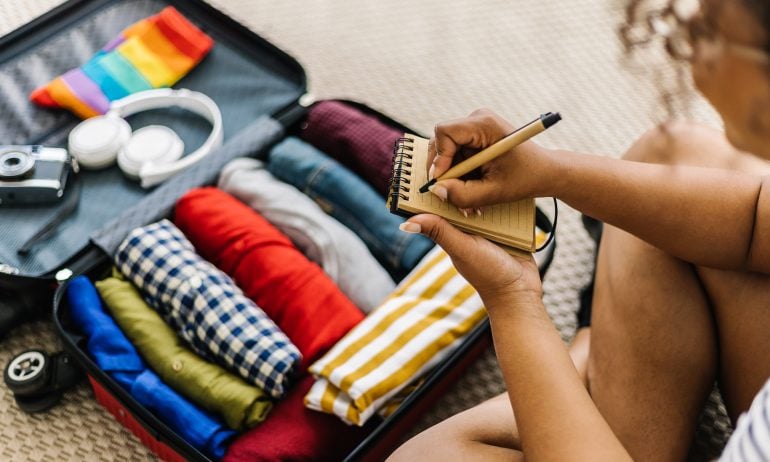Headed to the Paris Olympics? Pack These 6 Essentials

Many or all of the products featured here are from our partners who compensate us. This influences which products we write about and where and how the product appears on a page. However, this does not influence our evaluations. Our opinions are our own. Here is a list of our partners and here's how we make money.
As the Summer Olympics approach, start planning your packing list now. A trip to the Paris Olympics, which will run from July 26 to Aug. 11, can call for some essentials that you might not need for a trip elsewhere.
Sure, you might need to buy some new clothes and comfortable shoes for the occasion. But you might also need to apply for a visa and perhaps a new credit card. Besides the predictable guidebook recommendations around what to pack, here are six items to consider acquiring before departure:
1. A Visa credit card, otherwise cash
Visa has sponsored the Olympics since 1986 in an agreement that’s set to run through at least 2032. That deal allows Visa to dominate how you pay for certain Olympic purchases.
If paying by credit card, Paris 2024 Official Shops only accept Visa. If you want to buy official swag in Paris but you’ve got a card from another credit card processing network (say American Express, Discover or Mastercard), you’ll need to pay cash.
You'll also want to check if your credit card charges foreign transaction fees. Incurred when you use your credit card at a non-U.S. retailer, these common fees run from 1% to 3% of the cost of your transaction.
Many travel credit cards do not charge foreign transaction fees, so these cards could save you some money at souvenir stands and other retailers or restaurants in the city.
But you may not want to apply for an entirely new credit card purely to avoid transaction fees when buying souvenirs. In that case, it might be helpful to think ahead about how you can save on international ATM fees or order foreign currency.
2. A passport and perhaps a visa (the other kind)
Citizens of certain countries need a visa to enter France. The French government website outlines which visitors need a visa and, if so, how to start that application.
According to the U.S. Embassy, U.S. citizens with valid passports don’t need a visa as long as they’re traveling for tourism or business and for 90 days or fewer within each six-month period.
Your passport must also be valid for at least three months after your departure date. The U.S. Embassy recommends your passport have at least six months’ validity remaining. If yours doesn’t, consider renewing your passport now.
3. A light jacket
July and August are the hottest months in Paris, with average daily maximum temperatures of 25.7 degrees Celsius (78.3 degrees Fahrenheit), according to Météo-France, the French national meteorological service.
Still, bring layers, as average lows drop to 16 degrees Celsius (60.8 degrees Fahrenheit). Plus, indoor competition venues might be chilly, and you might want a jacket in case it rains.
4. A small folding umbrella
Speaking of rain, you might also want an umbrella. According to Météo-France, July and August experience seven to eight days of rain on average. But don’t bring large, non-folding umbrellas. Only small folding umbrellas are allowed inside competition venues.
5. A portable smartphone power bank
More aspects of travel necessitate phones. These days, you might use your phone to scan your boarding pass or as a hotel room key. The 2024 Paris Olympics has a dedicated mobile app to display competition schedules, results, interactive maps and details about sessions.
But the app only works if your phone works. Portable smartphone power banks can cost less than $20 and provide a boost to low batteries — as well as some peace of mind.
And while many phone functions work without a cellular connection, you might still want to text, call and use data while abroad. If so, plan ahead. Using data abroad can sometimes be expensive without the right international phone plan.
6. Comfortable shoes
While event organizers say they are working to increase public transport availability, expect large crowds on shuttles between venues. In some cases, walking might be a more practical way of getting around the 2024 Paris Olympics.
Plus, public transit fares will be higher between July 20 and Sept. 8. Valérie Pécresse, the president of the Île-de-France region that includes Paris, said in a video posted to social media that single metro journeys will temporarily cost 4 euros, up from the current price of 2.15 euros.
Walking won’t cost you any money, though it might cause blisters without the right walking shoes. Pack shoes you’ve already worn for long walks pain-free.
What items to skip
While knowing what to pack is critical, so is knowing what not to pack. There will be security checks to enter the 2024 Paris sporting venues. Security guards will not allow items such as alcohol, professional cameras, laser pointers or even certain containers. Check with the venue for a full list of prohibited items. And don’t expect any official bag checks where you can stow your belongings if you do bring anything that's prohibited.
Also, there are stringent guidelines for certain items. For example, plastic or metal water bottles are OK — but not glass bottles or bottles 75 centiliters (about 25 ounces) or greater.
And as is often the case with packing: Less is more. If you can minimize your stuff to the point that you’re flying carry-on, you may have a more peaceful flying experience. Plus, arriving with fewer things just means more room for souvenirs.


